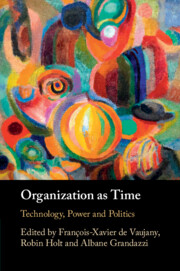Book contents
- Organization as Time
- Organization as Time
- Copyright page
- Contents
- Figures
- Tables
- Contributors
- Organization as Time
- Part I The Politics of Time: Ontologies and Metaphysics of Organization as Time
- Part II Re-orienting Critique in Organization Studies? Exploring Jointly Time and Politics
- Part III New Ways of Organizing Work, Digitality and the Politics of Time
- 9 ‘Working the Time’
- 10 Temporal Structures of Telework in Public Sector Organizations
- 11 Towards a Processual Understanding of Buildings
- 12 The Temporality of Entrepreneurship
- 13 Management as Dramatic Events
- Part IV History and Duration: Making Things Last, Enduring Politics and Organizing
- Index
- References
13 - Management as Dramatic Events
Intense Decentred Organizing (IDO)
from Part III - New Ways of Organizing Work, Digitality and the Politics of Time
Published online by Cambridge University Press: 22 June 2023
- Organization as Time
- Organization as Time
- Copyright page
- Contents
- Figures
- Tables
- Contributors
- Organization as Time
- Part I The Politics of Time: Ontologies and Metaphysics of Organization as Time
- Part II Re-orienting Critique in Organization Studies? Exploring Jointly Time and Politics
- Part III New Ways of Organizing Work, Digitality and the Politics of Time
- 9 ‘Working the Time’
- 10 Temporal Structures of Telework in Public Sector Organizations
- 11 Towards a Processual Understanding of Buildings
- 12 The Temporality of Entrepreneurship
- 13 Management as Dramatic Events
- Part IV History and Duration: Making Things Last, Enduring Politics and Organizing
- Index
- References
Summary
The pandemic has settled work and management situations in which collaborators more rarely meet. Beyond issues of maintaining a sense of co-presence, what seems to be more and more at stake is the dramatization and intensification of encounters on site but also the dramatization of remote narrative events in the future or the past. Collaborators, customers, need to meet physically at some point in a meeting room, and something need more than ever to happen at this moment. But beyond that, organizing needs also to have an intensity. Discussions around projects, problems, opportunities, happen in the flow of an open life, in a decentered way. Organizing events of the past and the future thus need to call each other, to intensively call each other in time. Managers need to build dispersed narrative events likely to intensively elaborate this dramatic resonance for people continuously coming in and out of ephemeral projects. This Intense Decentered Organizing (IDO) based on intense moments of co-presence and intensification of past and future events is a huge stake of our time. And more than ever, dramatization and theatralization appear as very important new regimes of historicity and eventfulness.
Keywords
- Type
- Chapter
- Information
- Organization as TimeTechnology, Power and Politics, pp. 275 - 294Publisher: Cambridge University PressPrint publication year: 2023

